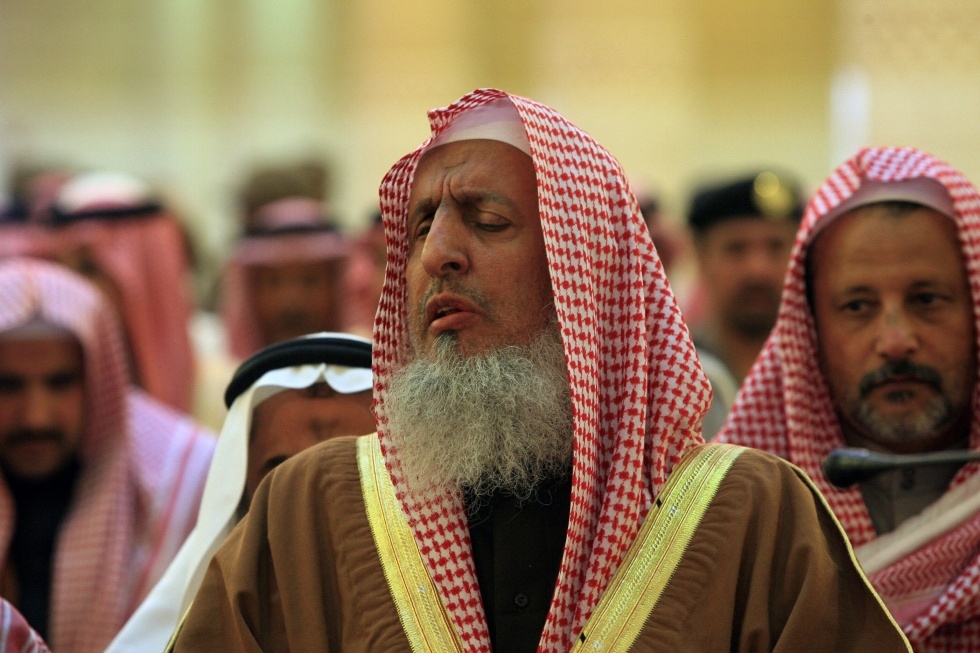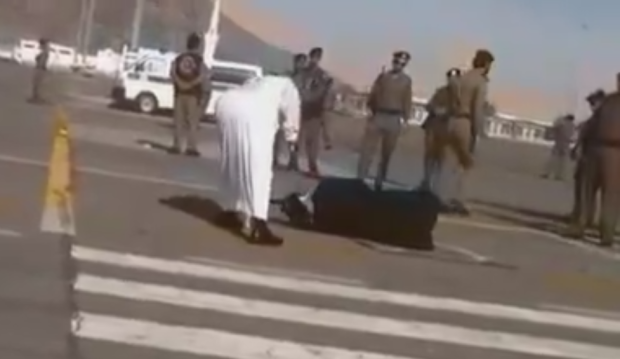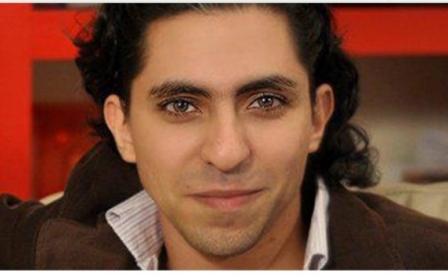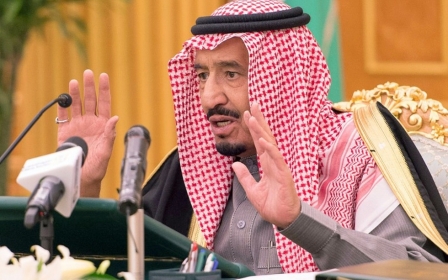Saudi Arabia publicly beheads a woman in Mecca

Authorities in Saudi Arabia publicly beheaded a woman in the holy city of Mecca this week, according to footage sent to MEE on Thursday and local media reports.
Laila Bint Abdul Muttalib Basim, a Burmese resident of Saudi Arabia, was convicted of torturing and killing her seven-year-old step-daughter and executed by the sword on Monday.
Footage of the execution shows Basim being dragged into a street and held down by four police officers.
“I did not kill, I did not kill,” she is heard to shout repeatedly.
Basim then screamed as a sword-wielding man struck her neck. Second and third blows completed the beheading and authorities swiftly removed her body from the road moments later.
Human rights activists in Saudi Arabia explained how the woman was executed.
“Authorities have two methods of beheading people,” said Mohammed al-Saeedi, from the Eastern Province. “One way is to inject the prisoner with painkillers to numb the pain and the other is without the painkiller.”
“This woman was beheaded without painkillers – they wanted to make the pain more powerful for her.”
A Ministry of Interior statement said the execution had been done to protect “security”.
“The Ministry of Interior announces this news to confirm that the government of the Custodian of the Two Holy Mosques, may God protect him, is greatly concerned with restoring security and realising justice,” read the statement published by SPA.
“It implements the rulings of God against all those who attack innocents and spill their blood. The government warns all those who are seduced into committing similar crimes that the rightful punishment is their fate.”
The case has stirred debate in online forums around the way in which authorities handled the execution.
"I saw a video today of your [Interior Ministry] execution of a Burmese servant for killing her step-child," read one post on an online forum, which saw users generally agree on the punishment but disagree with how it was carried out.
"I don’t object to the sentence, but I do object to the way it was done, which some see as cruel. There are many ways to kill without using a sword, especially for women. The publication of this video will cause a wave of fierce anger around the world, which you will see very soon."
Posters explained that the sword is the "most humane" method of carrying out executions, although some questioned whether the woman was guilty given her exclamation she had not killed her step-daughter.
"A guilty offender, at the moment of execution, is plagued by their conscience, and the best conclusion to an execution is if the sentenced person confesses to the crime. This woman’s insistence that she is innocent and never committed the murder is more than a small sign that we should question how she confessed and the documents according to which she was sentenced."
Saudi Arabia has executed nine people in the first 14 days of 2015. In 2014 they executed a total of 87, up from 78 in 2013, which saw the conservative kingdom record the third highest number of executions, behind Iran and Iraq.
According to Human Rights Watch 72 of the 87 executions in 2014 took place between August and December and 43 percent of those killed were foreign nationals, including two women.
The spike in executions, according to Saeedi, is down to authorities wanting “to show people they are powerful.”
“They used to execute people in central areas of cities but since the beginning of 2014 they beheaded people all over the place,” Saeedi told MEE. “In the past when public executions took place lots of people would gather to watch. “But now, with all the killings, just a few people turn up. When there is an execution in the streets now people just walk on by, because it has become normal.”
“The situation here in Saudi Arabia is dark. And it’s getting darker.”
Footage of the execution was posted to YouTube by numerous people but has been repeatedly taken down by the video sharing website.
The National Organisation for Human Rights in Mecca held Saudi security services responsible for the video’s circulation. The group called for the person who shot the footage to face criminal sanctions.
Mohammed al-Sehli, the group’s spokesperson, told the Mecca news site security services should clear the area before executions are carried out, in order to prevent such “leaks”.
Sehli stressed the importance of investigating the person who shot the video and lodging the maximum possible criminal sanctions against him.
He also said it was “natural” for the woman to be on the ground crying out in pain given “the ugliness of killing a child”.
Middle East Eye propose une couverture et une analyse indépendantes et incomparables du Moyen-Orient, de l’Afrique du Nord et d’autres régions du monde. Pour en savoir plus sur la reprise de ce contenu et les frais qui s’appliquent, veuillez remplir ce formulaire [en anglais]. Pour en savoir plus sur MEE, cliquez ici [en anglais].





